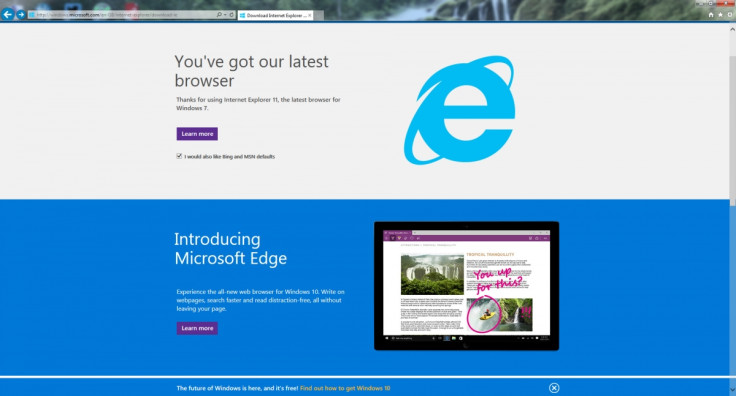Is Microsoft hiding Get Windows 10 ad generators in Internet Explorer security patches?

Microsoft's latest security patch for Internet Explorer 11 seems to include the function to generate ads pestering Windows 7 and Windows 8.1 users to upgrade to Windows 10, according to documentation on the Microsoft support blog.
Security patch KB 3139929, which was released on the Patch Tuesday (8 February), contains several updates. According to Microsoft, it is designed to prevent hackers from executing remote code in IE11.
However, Woody Leonhard of InfoWorld discovered that the documentation on Microsoft's blog clearly admits to putting some sort of ad generator into the security patch. According to one of the Leonhard's sources, after Internet Explorer is updated, it will then annoy users whenever they open a new tab in the browser by having a blue banner pop up that says: "Microsoft recommends upgrading to Windows 10".
The security patch page also breaks down six other included updates that have nothing to do with security problems at all – most of them relate to performance issues and small browser bugs, but the last patch update, KB 3146449, clearly states: "Updated Internet Explorer 11 capabilities to upgrade Windows 8.1 and Windows 7".
A further page just on the KB 3146449 patch states:"This update adds functionality to Internet Explorer 11 on some computers that lets users learn about Windows 10 or start an upgrade to Windows 10. Before you install this update, see the Prerequisites section. For more information about Windows 10, see Windows 10."
And you can't uninstall that part of the update
Elsewhere on the internet, Windows users are reporting that even if you are discerning and tend to check every single Windows update before deciding which ones are safe to install, there is no way to do this with the IE11 security patch. When KB 3139929 is installed on your machine, the update KB 3146449 (which contains the ad generator) is not listed as a separate entry, so you cannot install it and then delete that particular update, or prevent it from being installed.
Unfortunately, despite the best efforts of Leonhard and the posters on Leonhard's AskWoody blog, no one has been able to replicate the blue banner mentioned by Leonhard's source, and nobody really wants to install security patch KB 3139929 in case they are then subjected to more Windows 10 advertising.
IBTimes UK launched IE11 and we were able to see the blue banner (click to enlarge top image), but it only came up at the bottom of the screen on the official Internet Explorer website. We have contacted Microsoft asking why this update has been included in the IE11 security patch at all and are waiting for a response. However, to us, this clearly is another reason why people should stop using Internet Explorer forever.
Windows 10 is meant to be the last Windows PC operating system ever developed, as the computing giant is moving towards a model whereby users pay a subscription fee to receive new features (similar to Adobe's business model for Photoshop).
However, Microsoft has been mired in controversy since even before the launch of Windows 10, when news broke that the firm planned to store everyone's Wi-Fi network passwords on its server while tracking the computer usage of Windows 10 users.
Since the launch, it has also been discovered by users that Microsoft is secretly downloading 6GB of Windows 10 files onto machines that haven't upgraded; the Threshold 2 update deletes default programs and freezes during the update; and most recently, Windows 10 updates are forcing PCs to use Microsoft products to open various file formats as a default instead of allowing the user to choose for themselves.
© Copyright IBTimes 2025. All rights reserved.






















